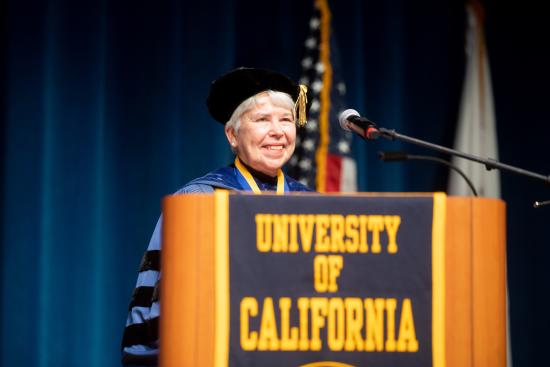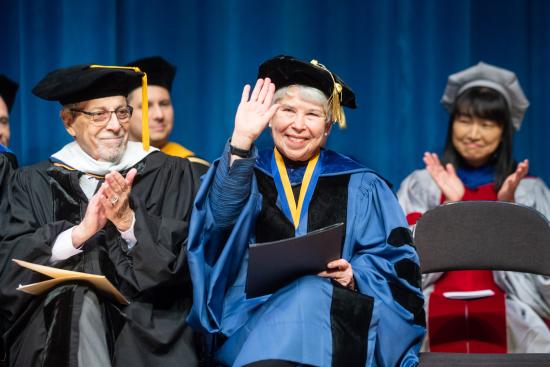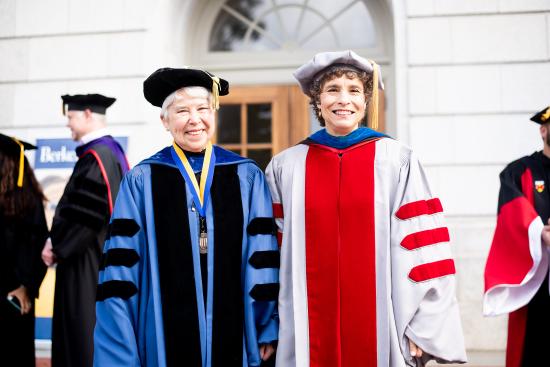Chancellor Carol Christ gave the following address to the School of Information graduating class on May 19, 2019:
Thank you, Dean Saxenian, for the opportunity to address this year’s graduating class.
First, I’d like to echo the many congratulations we’ve heard today. You all have just completed a demanding course of study at one of the nation’s leading information schools, and I want to acknowledge your diligence, your perseverance, and your resilience. You have undoubtedly made sacrifices. You have dedicated days and nights and weekends to your academics. Perhaps you juggled school alongside a full-time job, or completed your coursework as you were starting a family. And now, at the end of your studies here, you are likely experiencing a mix of relief, elation, wonder, and apprehension. But in addition to all that, I hope you also hold a keen sense of accomplishment.
I have been speaking at a handful of commencement ceremonies this spring, and one of the things that has been on my mind as I watch students graduate is the privilege and responsibility that comes with obtaining a Berkeley degree.
I have no doubt that you, armed with your master’s and doctorates from our information school, are apt to thrive in the information age. You have learned how to build and interpret statistical models, how to think critically about data, how to use python and tensorflow and spark and all sorts of other tools of your trade. You are at the forefront of how people interact with information and technology...and information and technology are embedded in so, so much of the modern human experience. You are in high demand — by startups, established companies, universities, think tanks, governments.
In short, through your experience and your studies, you have gained great power. And, in a bit of a wisdom that has been attributed sometimes to Voltaire and sometimes to Spider-Man comics: “With great power comes great responsibility.”
Given your skills, knowledge, and credentials... you will be put in positions of leadership that will have you shaping the relationship between humans and information in society. And you will need to draw on everything you have learned and experienced, for as we’ve seen over the last few years, this relationship is critical, contentious, and constantly changing.
How can we reinvent democratic decision-making in a world of increased connectivity and technologically-enabled concentration of power? What kind of privacy are we owed in digital environments? How should we form, train, and launch intelligent systems? How will assistive technologies, cognitive technologies, and other human-machine interfaces alter our lives and very humanity?
The I School’s human-centric approach to information and data science education has, I think, made you the kind of leaders we need to take on these questions... and I know you are up to the task, because you already have. Just looking through some of your capstone final projects shows your careful attention to issues that matter. You looked at using natural language processing to stop hospital billing errors. You built a communication assistant for people with speech disorders. You examined the impact of polling place closures on voter turnout. You created a system to detect rumors spreading on twitter. You developed a tool to help police deploy resources effectively and without discrimination bias. You built systems to improve the enrollment process of public schools in the Bay Area. I could go on and on.
This kind of creative, thoughtful problem solving, infused with an understanding of people’s needs and attentive to issues of justice and equality, is exactly what you will need to solve the great intractable problems of our time. In 1966, Robert Kennedy gave a speech at the Greek Theater here in Berkeley, and I’ll quote his words:
“All of us have the right to dissipate our energies and our talents in any way that we wish. But those who are serious about the future have the obligation to direct their energies and their talents toward concrete objectives consistent with the ideals that they profess... In your hands, not with presidents or other leaders, is the future of your world, and the best fulfillment of the qualities of your own spirit.”
Thank you. And now, in the few minutes I have left, I also want to take this opportunity to thank a person who has been so pivotal in the life of the School of Information for much of its 24-year history... and that person is your dean, Anno Saxenian.
As you likely know, Anno will step down this summer and return to her faculty position after having served as the leader of the I School for three terms, or a decade and a half. It would be difficult to overstate the influence she has had in her time here. Upon taking up the deanship, she led efforts to refocus the school and its academics, as well as give it a new name and a new mission. She then led the school through a period of remarkable growth...more than doubling the size of its faculty and establishing its first faculty chair, doubling the size of its Ph.D. program, and introducing an array of fellowships to support graduate students. She spearheaded the creation of two professional online master’s programs — MIDS and the Master of Information and Cybersecurity — which have allowed the school to expand its reach and impact tremendously. While there were fewer than 100 students enrolled when Anno began her tenure, today, the school enrolls more than 700 across its programs.
In addition to this growth, Anno also helped establish the I School’s two interdisciplinary research centers: the Center for Long-Term Cybersecurity and the Center for Technology, Society, and Policy. She launched the annual DataEDGE conference, which draws leading scholars and data science professionals to campus to assess the implications of the data revolution on every aspect of our lives.
Beyond all this, Anno has been an incredibly important role model as one of the first women deans on the UC Berkeley campus, and has led an array of I School initiatives that aimed to increase the number of students and faculty from backgrounds historically underrepresented in tech. Her success has been tremendous: This coming fall, half of I School Ph.D. students will be women. MIMS enrolls more than 50% women, and has done so since this past fall. MIDS has gone from 20% women to 30% in four years. And women comprise 38% of I School faculty — a fair amount higher than the campus’s 31%.
Anno’s leadership, as well as her counsel and wisdom and friendship, will be sorely missed. I am grateful that we will continue to have her on campus as a faculty member as the I School enters its latest chapter as part of the Division of Data Science and Information.
Congratulations to all of our graduates. Please join me in extending my deep gratitude to Anno for all that she has done for our campus, and for shepherding the I School into an exciting new era.












